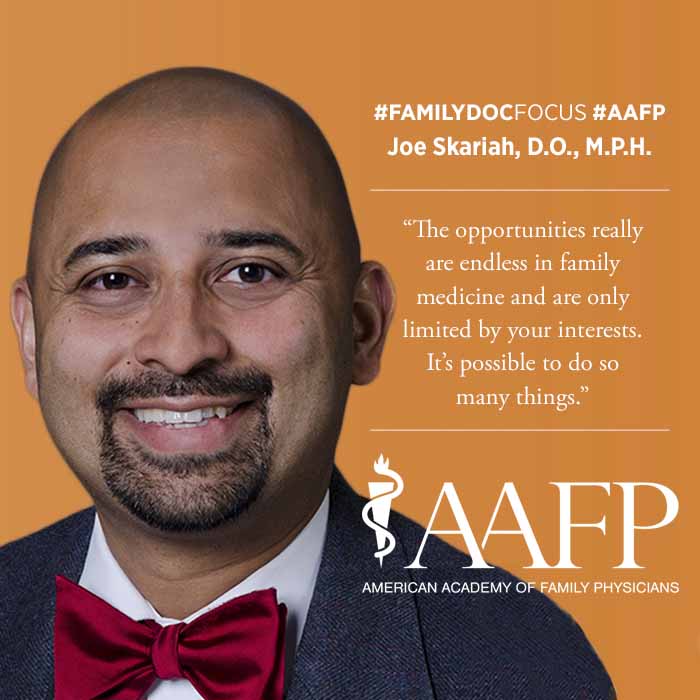Rural, Urban, OB and More: This Family Doc Does It All
October 21, 2019 10:03 am David Mitchell – Joe Skariah, D.O., M.P.H., will have a simple message for medical students during a Nov. 6 AAFP webinar about career paths in family medicine.
"The opportunities really are endless in family medicine and are only limited by your interests," said Skariah, the family medicine residency program director at the Oregon Health & Science University in Portland. "It's possible to do so many things."
As someone who has been able to pursue all his interests in family medicine, Skariah speaks from a wealth of experience. During his training, Skariah envisioned himself practicing full-scope family medicine in a rural community, but his wife's training as a pediatric physical therapist necessitated that the couple live near an urban area. It looked, initially, like rural medicine wasn't in the cards.
"When I left residency, I ended up in a Seattle suburb doing OB and outpatient medicine," he said. "Two or three years into it, I was really enjoying the clinical work, but I missed the education piece and started looking for academic opportunities."
Skariah found everything he was looking for when he joined the OHSU family medicine faculty in 2012. Two years later, he became medical director of the university's rural health center, located in Scappoose, Ore., as well as an associate director of the residency program in Portland.
Skariah bases his full-scope family medicine practice at his clinic in Scappoose, which has a population of about 7,000 and is in a county that does not have a hospital. He practices inpatient care, including obstetrics, a little more than 20 miles away in Portland. His wife, meanwhile, works just across the state line in Vancouver, Wash.
"It's a win-win," said Skariah, who delivers about two babies a month. "We both got what we wanted. I've gotten to do both urban and rural medicine. It's been very rewarding. Patients in Scappoose want us to handle all their health care needs. Having that responsibility is what's really enjoyable."
Skariah was director of two long-term care facilities in Scappoose for four years before moving up the ranks in the residency program. He became the residency program's director in January and also serves as a county health officer, helping track communicable diseases in the area.
Working with residents, he said, has reaffirmed his career choices.
"They ask questions you don't expect," he said. "It keeps me on my toes and up to date. You not only have to know the answers to their questions, you have to know 'the why' because they are going to ask why. It's great. It keeps clinical practice fun because it feels like a team."
OHSU operates a four-year residency program with 48 residents and four continuity clinics. Skariah said the extra year allows for a "robust amount of inpatient and OB work" as well as "customizable time for residents to think about their own career trajectories" and any additional training they may need.
He said more than half the program's graduates work as faculty and provide care in underserved areas.
"These are physicians who will be prepared to be leaders in their communities," said Skariah.
The Academy's Nov. 6 webinar, scheduled to air from 2:30 to 3:30 p.m. CST, will also feature Michelle Roett, M.D., M.P.H., professor and chair in the Department of Family Medicine at Georgetown University Medical Center in Washington, D.C., and Chase Mussard, a fourth-year student at East Tennessee State University's James H. Quillen College of Medicine in Johnson City who is national coordinator of the AAFP's Family Medicine Interest Group Network.
